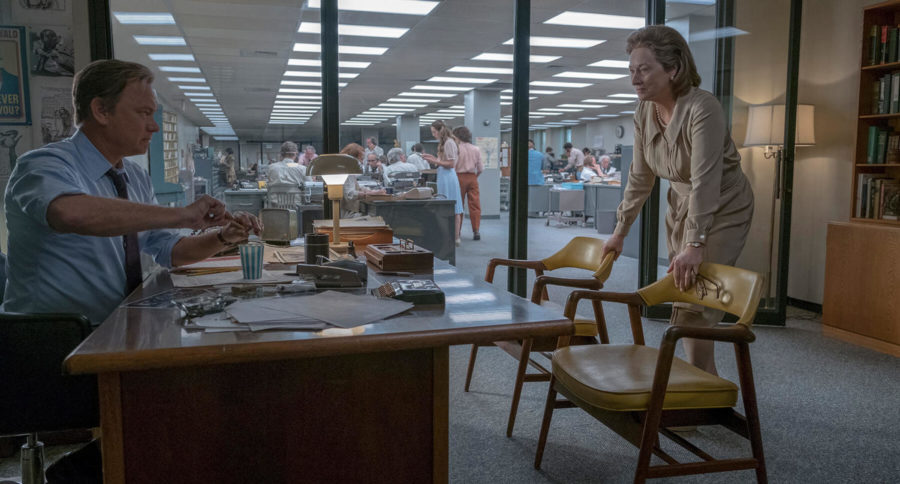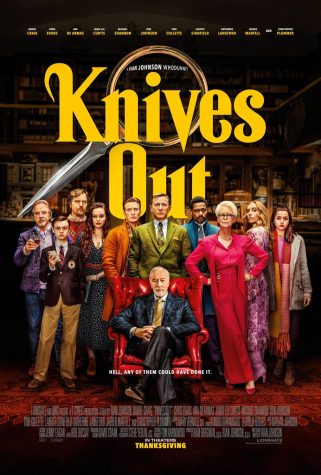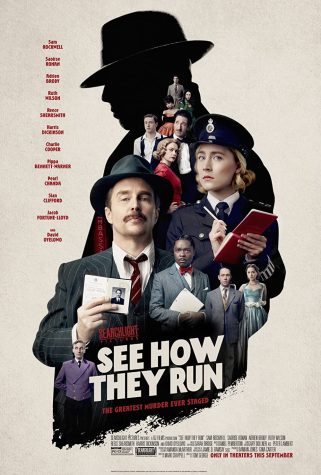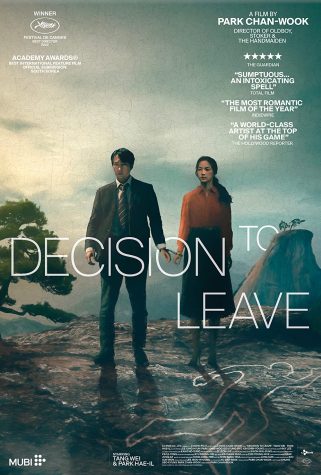‘The Post’ Piles on the Drama But Fails to Deliver Impact
The Post has been hailed as a political drama full of conflicted characters and relevant to the times. While I do see the drama part about how “democracy dies in darkness,” I felt no love lost on any of the star-studded cast, nor did director Steven Spielberg explore the full complexity of the issue. Ironically, “The Post” felt more concerned with First Amendment cheerleading than doing the truth justice.
Kay Graham, the Washington Post’s publisher, has just taken the company public and opened up the Post to investors. In addition to navigating the new financial road this has placed her once-family-owned company on, Graham struggles to stand up for herself in the journalism world, which is dominated by men (and, for her, financial investors convinced they know better about her business than she does).
This journey into new horizons for the Post encounters a sudden obstacle when the New York Times publishes the now-infamous Pentagon Papers, top-secret documents insinuating the government had known almost since the beginning of the Vietnam War that it was not a battle the United States would win. These revelations shock the public, and when the government reacts by banning the Times from releasing any further excerpts of the Pentagon Papers, Graham must rely on her own discernment and the drive of her editor, Ben Bradlee, to grapple with the controversy.
As a publication devoted to a free press and pursuit of the truth, should the Post release more of these papers and reveal more of the government’s lies? Or should the Post refrain from publishing further excerpts from the Papers in the face of a government-issued order that could cripple both the Post’s ability to publish and its financial future?
Meryl Streep, as Kay Graham, the Washington Post’s first female publisher, is indecisive and slow to speak, but when it comes to the pivotal moment, she gambles her whole life and fortune without much hesitation at all. She fiddles with her glasses to the point that she is just tiresome; her aging stutter serves no real purpose other than to drag the conversation on. At the climax, she takes just split seconds to make her crucial decision, undermining the buildup and characterization the first half of the film emphasized. The expected character arc was never developed or resolved; the only change we see is the brightening of her wardrobe from navy to gold. Discussions of gender discrimination were teased but ultimately dropped entirely, an opportunity missed.
However, there’s something to be said about Streep’s portrayal of Graham as a hesitant woman struggling to find the power in her position while everyone around her continues to underestimate her; we often don’t see that timidity in protagonists, although all of us have had moments where we fail to speak up, even if we know we should. By introducing Graham to her audience in such a way, the film hinted that her established apprehension would blossom into more confidence as she grows to accept her leadership of the Post.
However, we never see a full transformation from her; Graham shows tentativeness for only several tense seconds before she decides to publish further excerpts from the Pentagon Papers — a direct contradiction to the quiet, tongue-tied woman the movie spends the first 30 minutes showing us. I would have been fine with such a contradiction had there been further development of her character showing her growth into a more assertive, outspoken publisher. But we do not get this, leaving Graham’s decision as one that subverts her character arc instead of further developing it.
Tom Hanks doesn’t seem comfortable in his role as editor Ben Bradlee, either, his expletive-filled rants in his newsroom office about President Nixon “sh*tting all over the First Amendment” not leading anywhere. On first impression, Ben Bradlee seemed to be a confident, competitive, militant editor with a “go get ‘em” attitude. And we must have been right, because this is the only glimpse of his personality we see.
Though most of the “action” in the film (apart from Graham actually making the decision to publish stories on the Pentagon Papers) involves Bradlee and his journalists, it’s hard to feel as well-acquainted with Bradlee as we both wanted to be. We learn little more about his motives than his envy of the New York Times and his unexplained idealism in reporting the truth — a jarring mix that, again, is underdeveloped.
We know he’s stubborn, determined and passionate about using journalism as a vehicle to pursue the truth, no matter how ugly or uncomfortable that truth may be. However, this stubbornness — which seems to be portrayed by the film as an admirable trait — comes across mainly in the form of shouting, grumpy remarks, and colorfully-worded tirades.
Outside of his rants, there is little character development, despite attempts to show the softer side of him in Bradlee’s interactions with his wife. The personal touch his scene with his wife is supposed to lend falls flat; we get little more than her inspirational speech and a demonstration of his ego.
The storytelling reaches for too much at once, darting between Streep and Hanks without clarity of purpose. As separate storylines, any faults in the performances of such esteemed actors could have been excused. But it is when these storylines merge and Graham and Bradlee interact that these characterization flaws emerge.
They appear reluctant to work together; Bradlee feels Graham is leashing him, and Graham feels it’s her responsibility to defend the credibility of the paper to investors, which sometimes might mean disagreeing with Bradlee. They go from bickering business associates to partners navigating a sticky case of free speech with federal implications — only, their one-dimensionality prevents viewers from becoming invested in their friendship. Graham is worrisome and attempting to claim her authority, and Bradlee, in his zeal for publishing the truth (and meeting deadlines), encourages her to assert herself in the face of skeptical peers.
Yet this development is only implied, not necessarily shown; they seem fond of each other by the end of the film. But, as viewers, we didn’t feel their camaraderie.
That being said, the cinematic production is breathtakingly beautiful. The unique camera angles so many scenes were shot in — over journalists’ shoulders, above them all, under the tables at dinner parties where Graham comes into her own— made us feel like journalists, observing everything unravel from very intimate, very unique perspectives.
The message behind the film is just as powerful. This film is a tribute to journalism’s pursuit of the true — and full — story, and that passion for storytelling is captured well during scenes in the newsroom and copy room. The printing process is filmed as an almost sacred ritual — the movie almost deems that process an act of love. Moments of nail-biting anticipation and the euphoria that comes with chasing a story are well and realistically-captured; it makes me even fonder of the newsroom.
As a side note, many critics have noted the parallel to the current presidential administration, but the screenplay was written during the Obama administration. Politics aside, “The Post” is still glorious in its message and technique without any particular relevance to the social context, but the lack of internal conflict development hinders it from becoming a classic like “All the King’s Men,” the iconic Watergate movie.
Don’t get us wrong: The Post is an impressive affirmation of what one risks as a true journalist. We just wish the process hadn’t lost itself in the product.









Mrs. Shields • Feb 10, 2018 at 9:48 pm
I’ve read this review seven times. Not only is it exceptionally written, it critically reviews a film that earned accolade even before its release. Carefully and mindfully crafted, the piece is a perfect example of a robust review at its finest. With excellent detail and word choice, I’m especially impressed by the attention to character analysis and plot movement. And written by journalists… the movie that is “for journalism.” Well done!